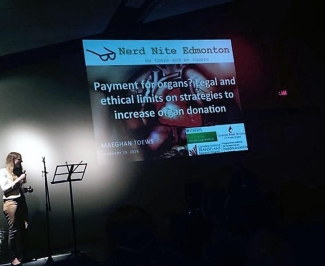James Kreppner Award goes to University of Saskatchewan’s Alana Cattapan
Wednesday, May 09, 2018 Jenny Ryan
Alana Cattapan, assistant professor in the Johnson Shoyama Graduate School of Public Policy (JSGS) at the University of Saskatchewan (U of S) has been awarded the Canadian Blood Services’ James Kreppner Award ($43,275) to study the issues related to the commercialization of blood and tissue in Canada.
James Kreppner was a former board member of Canadian Blood Services and a strong advocate for blood safety. He challenged assumptions when necessary and inspired the highest standards of analysis and decision-making. This award named in his honour supports research of high quality, to inform legal and policy questions related to the products and services provided by Canadian Blood Services today.
We took a few minutes to chat with Alana about her work and the project this award supports.
Who are you and what do you do?

My name is Alana Cattapan and I am an Assistant Professor in the Johnson Shoyama Graduate School of Public Policy at the University of Saskatchewan.
What is your area of research?
My research focuses on the governance of women’s health in Canada. I conduct a lot of research on reproductive technologies, but also reproductive labour, and the commercialization of the body. I am also conducting a range of projects that focus on issues of access to health care services that are often excluded from provincial health insurance programs.
I often study the discourses related to payment for human sperm and eggs, and I continue to conduct research that examines ethical, legal, and social concerns related to the commercialization and commodification of body parts. The establishment of for-profit plasma clinics in Saskatoon and Moncton have motivated me to think about the relationship between reproductive tissues and plasma, blood, and organs in new ways.
Why did you apply for the James Kreppner Award? How will it support your work?
Canadian jurisdictions have legislation that ban the sale of organs, but this legislation includes exemptions for other body parts. For example, in Nova Scotia, blood and blood constituents can be sold, as can “zygotes, oocyctes, embryos, semen, or ova.” The legislation used to include skin and bone and other tissues “replaceable by natural processes of repair” but it was amended in 2010. With rising concerns about the impacts of paying for plasma, some provinces are tightening up their laws, and Quebec, Ontario, Alberta and BC now restrict the sale of plasma, although this is not the case everywhere.
My work will identify the arguments and debates that have occurred over time, in legislatures across the country to identify how different exemptions for the sale of different body parts have come about. My goal is to identify the historical evolution of these exemptions, where we are today, and how we can use historical arguments to establish a more ethically consistent and harmonized approach to the sale of human body parts—including plasma—in Canada.
The James Kreppner Award will allow me to take the time to work through the histories of arguments and discourses related to payment for body parts in ways that extend well-beyond reproductive tissues. I’m a new professor with a lot of demands on my time, and the Kreppner Award will allow me to focus on this research quite a bit. It will also allow me to engage with my co-applicants (Barbara von Tigerstrom, Erin Nelson, and Rosanne Dawson). It will also support my student research assistants who will help me with this project and allow us to make this research accessible to audiences across the country.
What do you hope to achieve with your project?
The project has four central objectives. The first is simply to find out how this wide range of exemptions came to be include in human tissue legislation in Canada –to get this research done. The second is to consider what legal reform strategies could be used to get the provinces more closely aligned on this issue. The third is to disseminate our findings in ways that could be taken up by law associations, policymakers, and politicians, that is, to make law reform happen. And the final objective is to make sure that the Canadian public has a clearer understanding of why consistent, ethically informed governance of the sale of human tissues across Canada is an important issue.
Why is this work important for you, and for Canada?
This work is important to me because while I’m relatively new to Saskatoon, I’m committed to this community and am concerned about the payment for plasma and its potentially detrimental effects on blood donation in the city. And while blood donation has surged following the tragic accident involving the Humboldt Broncos, as a citizen, a blood donor, and a scholar committed to the non-commercialization of the body, I am worried about the long-term sustainability of blood donation in my new province.
This work is important for Canada for some of the same reasons, notably the ongoing need for a sustainable, safe blood donation system. But the project, and the investigation of the arguments over time, will also reveal whether commitments to the non-commercialization of body parts remains strong in Canada, and whether these concerns differ from province to province. Sorting out how to proceed and if altruism remains an important value can help guide our actions (and the actions of policymakers and politicians) in the years to come.
Canadian Blood Services – Driving world-class innovation
Through discovery, development and applied research, Canadian Blood Services drives world-class innovation in blood transfusion, cellular therapy and transplantation—bringing clarity and insight to an increasingly complex healthcare future. Our dedicated research team and extended network of partners engage in exploratory and applied research to create new knowledge, inform and enhance best practices, contribute to the development of new services and technologies, and build capacity through training and collaboration.
The opinions reflected in this post are those of the author and do not necessarily reflect the opinions of Canadian Blood Services nor do they reflect the views of Health Canada or any other funding agency.
Related blog posts
The James Kreppner Award program supports legal research relevant to Canadian Blood Services. Research priorities for the James Kreppner Award include the legal and regulatory aspects of (a) donation, collection, storage, and use of blood, blood products, and hematopoietic stem cells; and (b) organ and tissue donation and transplantation. The 2016 James Kreppner Award will support one project with up to $50,000 for a period of one year. This year’s competition closes Nov. 30 2016.
